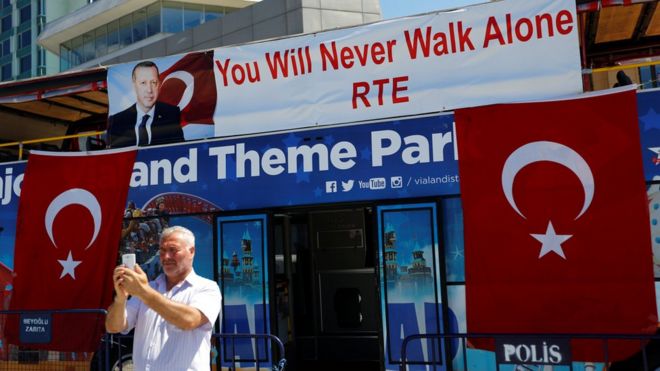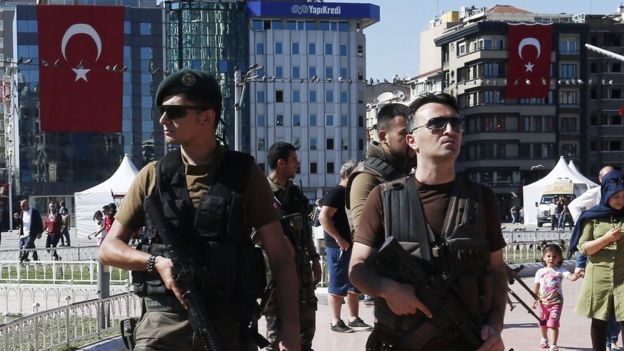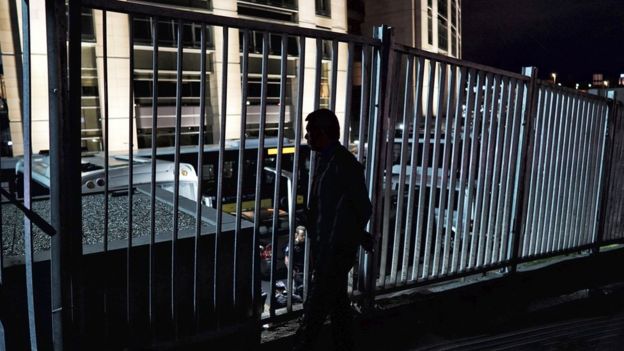Turkey coup attempt: Lives resume under state of emergency
Turkey coup attempt: Lives resume under state of emergency
- 21 July 2016
- Europe
 REUTERS
REUTERS
In the heart of Istanbul, Turkish flags dominate Taksim Square. For five days in a row since the failed coup, people have taken to the streets here to show their support for President Recep Tayyip Erdogan and the government.
On the steps of Gezi Park, which was the epicentre of anti-government protests three years ago, is a recently-erected platform. Between them hangs a banner with a Turkish flag imprinted on it that reads: "Sovereignty belongs to the Nation".
Thousands gathered here to watch President Erdogan on giant screens on Wednesday night as he announced the implementation of a three-month state of emergency. Some in the crowd burst into applause, clearly appreciative of the measure.
Mr Erdogan pledged that the country's democracy would not be harmed and fundamental rights and freedoms would not be curbed.
"This step is taken to cleanse the supporters of the Fethullah Gulen terrorist organisation from state bureaucracy, to place the state in strong hands in order to make democracy function better," he said.
- Who's the target of Erdogan's purge?
- Cleric Gulen condemns post-coup 'witch-hunt'
- How mobiles beat tanks and saved Erdogan
- Who was behind coup attempt?
- Why did Turkish coup plot fail?
The headline of one pro-government daily on Thursday read: "No compromise from democracy", highlighting Mr Erdogan's comments. Another read: "State of emergency for the coup plotters, peace for the citizens".
 EPA
EPA
But that is not a mood shared by everyone in Turkey, which is already a country divided along political or ideological lines.
Amongst the government's critics there are concerns that the announcement of a state of emergency might lead to more authoritarian rule, giving President Erdogan greater powers to sideline parliament.
Our lives will be tougher: View from Istanbul
On the streets of Istanbul, people hesitate to speak on the subject. Those who agree to speak ask for their last names to be withheld.
"I do not think we deserve this," says Sengul, a journalist. "The coup attempt was horrible. But what we are going through at the moment is awful too."
"The state of emergency will affect our daily lives. I do not see any reason why censorship will not be extended," she says.
Elif, an architect, shares similar fears. "We jumped out of the frying pan into the fire," she comments. "The arrests of thousands of people, followed by a state of emergency in the whole country, make us think our lives will be tougher."

Turkey's thwarted coup
 AFP
AFP- 22:00 (19:00 GMT) Coup attempt launched in Istanbul and Ankara on 15 July
- Bosphorus bridges blocked in Istanbul; warplanes attack police and intelligence buildings in Ankara
- Midnight: President Erdogan, who is on holiday in south-west Turkey, appears on CNN Turk via FaceTime to urge resistance
- Parliament in Ankara is bombed and soldiers and tanks fire at protesters
- 03:00 President Erdogan arrives safely at Istanbul airport and is mobbed by supporters
- 06:00 Soldiers surrender on the Bosphorus bridges
- At least 260 people were killed and 1,400 wounded
All timings approximate

Deputy Prime Minister Numan Kurtulmus assured Turks on Thursday that the government would not declare any curfews, free market rules would not be affected and fundamental rights would not be compromised.
"Our business has suffered. People do not want to go out on the streets unless they have to," says Kemal, a taxi driver.
"Now we have to wait and see. If they abuse the power to issue decrees, then we will be facing further problems," he says.
"I am anxious for the future of Turkey," says an academic whose work-trip to Canada has been blocked due to the latest crackdown. He does not want to give his name, and says no more.
Shattered lives
At Caglayan Court House, families of privates and military students accused of taking part in the coup attempt await the latest news.
Ahmet's 16-year-old son, studying at a military high school in Istanbul, was detained on Saturday morning and then imprisoned. He says he has seen him only once since then, and waved to him from a distance.
"I am worried," he says. "These kids had no idea what they were doing. Those who deceived them should be punished. But some say there will not be a fair trial anymore."
 AP
AP
"We don't know what will happen to us now," says Rifat, whose son - also a military school student - is detained.
"Will they extend the detention period? Will justice work? We don't know."
He says their lives are now completely shattered.
"Yesterday, the door bell rang. My nine-year-old daughter ran to open it, shouting: 'It's my brother!' My wife collapsed to the floor in agony," he says, unable to hold back his tears.
Comments